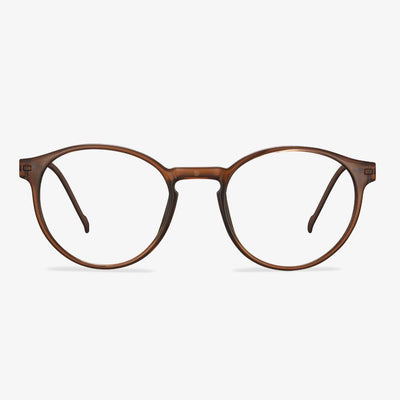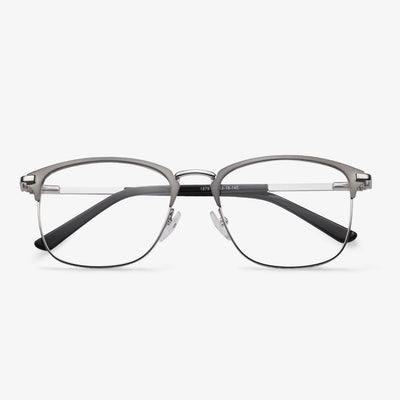Pay attention to the wearing of myopia sunglasses when driving.
Some drivers are slightly myopic, usually driving without wearing a myopic mirror. There is no problem. But once you wear sunglasses, the problem comes: your eyes are more likely to tire and your vision will decline, just as your driving vision will be affected at night. Therefore, for the driver of slight myopia, there is no problem in usually driving, but if you want to wear sunglasses, you must be equipped with the lens of myopia degrees.
When to Wear Blue Light Glasses?
If your eyes are experiencing signs of exhaustion after prolonged use of digital screens, you may benefit from blue light blocking glasses. So, please pay attention to what your body is trying to tell you, and there are some warning signs to look out for that tell you if you are in need of blue light glasses.
If you are suffering from one of the following symptoms, you had better wear a pair of blue light blocking glasses, such as headaches, eye strains, trouble sleeping, dry eyes and blurred vision. You can also check whether the symptoms are decreased after wearing the blue light glasses.
The design evolution of progressive lenses
Spherical and aspheric designs
The design of the front surface of the far-use area of the early progressive lens is similar to that of the ordinary spherical single vision lenses, so it is called a spherical progressive lens. Since 1974, the front surface of the far-use region of the lens is designed to be aspheric by designers, which not only reduces the peripheral aberration but makes the lens thinner, lighter, and less powerful.
Hard and soft design
For hard design, the channel is short, and the gradient is large. The near-use area position is high. The effective visual area of remote and near-use areas was larger. Peripheral astigmatism is relatively concentrated. Because surrounding astigmatism increases rapidly and the distribution is dense, the curve effect is more obvious. The gradient area is narrow. It is more difficult and takes longer for wearers to adapt.
Lenses with soft designs have slower gradients, longer gradients, and wider gradients. The angle of rotation of the eye from the far area to the near area is greater. It's easier to get used to. Compared with the hard design, the effective visual area of the far and near use areas is smaller, and the location of the near use area is lower.
Single, diverse, and individualized design
Initially, the progressive lenses used a single design, in which each basic curve was scaled equally and a luminosity combination was added within the range of its semi-finished lens blanks. The steepest base curve uses the same lens design as the flattest base curve. Lenses designers quickly realized that the overall performance of the lens could be improved by microcustomizing the lens design, leading to progressive lenses with multiple designs. This kind of design is called diverse design. By the mid-1990s, there was the emergence of individualized lens designs. In addition to using different gradients, these first individualized lens designs used steeper baseline curves with a slightly larger approach area to compensate for increased magnification and reduced field of view.
Symmetrical and asymmetric design
There is no difference between the left and right eyes in the symmetrical design of progressive lenses. As the eyes turn inward when they see near objects, the gradual gradient area gradually tilts to the nasal side from top to bottom, so the left/right progressive lenses should be rotated clockwise/counterclockwise respectively during processing. An asymptotic lens with left and right eye divisions is called an asymmetric design. The gradient is gradually and moderately inclined to the nasal side from top to bottom. The refractive force, astigmatism, and vertical prism of the two sides of the left and right gradient of the asymmetric design lenses are basically similar. At the same time, considering the characteristics of eye movement parameters in binocular vision, the peripheral aberrations of the corresponding positions of the left and right lenses were appropriately balanced to improve the visual effect of the wearer.
How do bifocal reading glasses work?
Bifocal reading glasses have two different lenses on the same lens. The top of the lens is your normal distance prescription, while the bottom is for close-up viewings, like reading. The two lenses allow you to alternate between them by moving your eyes up and down as needed. A bifocal lens is a type of lens that has two different areas of vision: one for close range and one for long-range. Typically, the upper section covers remote vision and the lower section covers reading. With a traditional bifocal lens, you can see the difference between the two lenses because the lower curve is a little different.
Take Frame material selection seriously.
When choosing a frame, try to choose a light frame. At present, the glass frame material is relatively light titanium, tungsten carbon, TR90, and so on. Now based on the plate spectacle frame, the new plate spectacle frame implements thin processing, so the whole spectacle frame has become light up. You can use rimless light glasses. Usually, the nose pad will leave an indentation, possibly because the glasses are too heavy. Changing some light glasses can improve the problem of indentation of the nose pads.
Do You Need Plano Glasses?
Many people choose to wear plano glasses or glasses without prescription just for cosmetic reasons, without any need for vision correction. Normally, glasses frames without a prescription come with a pair of cheap plastic demo lenses.
Since there is no corrective effect on plano glasses, some people choose wear plano glasses for protecting their eyes from dust, and other flying objects. In addition, plano lenses come in a variety of protective coatings - anti-glare, scratch-resistant, blue light coating, UV coating to provide all around protection to the eyes.
So, if you want to protect your eyes from some unexpected damage, you can choose to wear the plano glasses and they would not bring any damage to your eyes.
About Costco
Costco is a members-only warehouse club dedicated to providing its members with brand-name goods at the best prices. Costco has hundreds of stores around the world, providing a wide selection of merchandise. And the convenient specialty departments and exclusive member services, all are designed to make your shopping experience enjoyable.











































